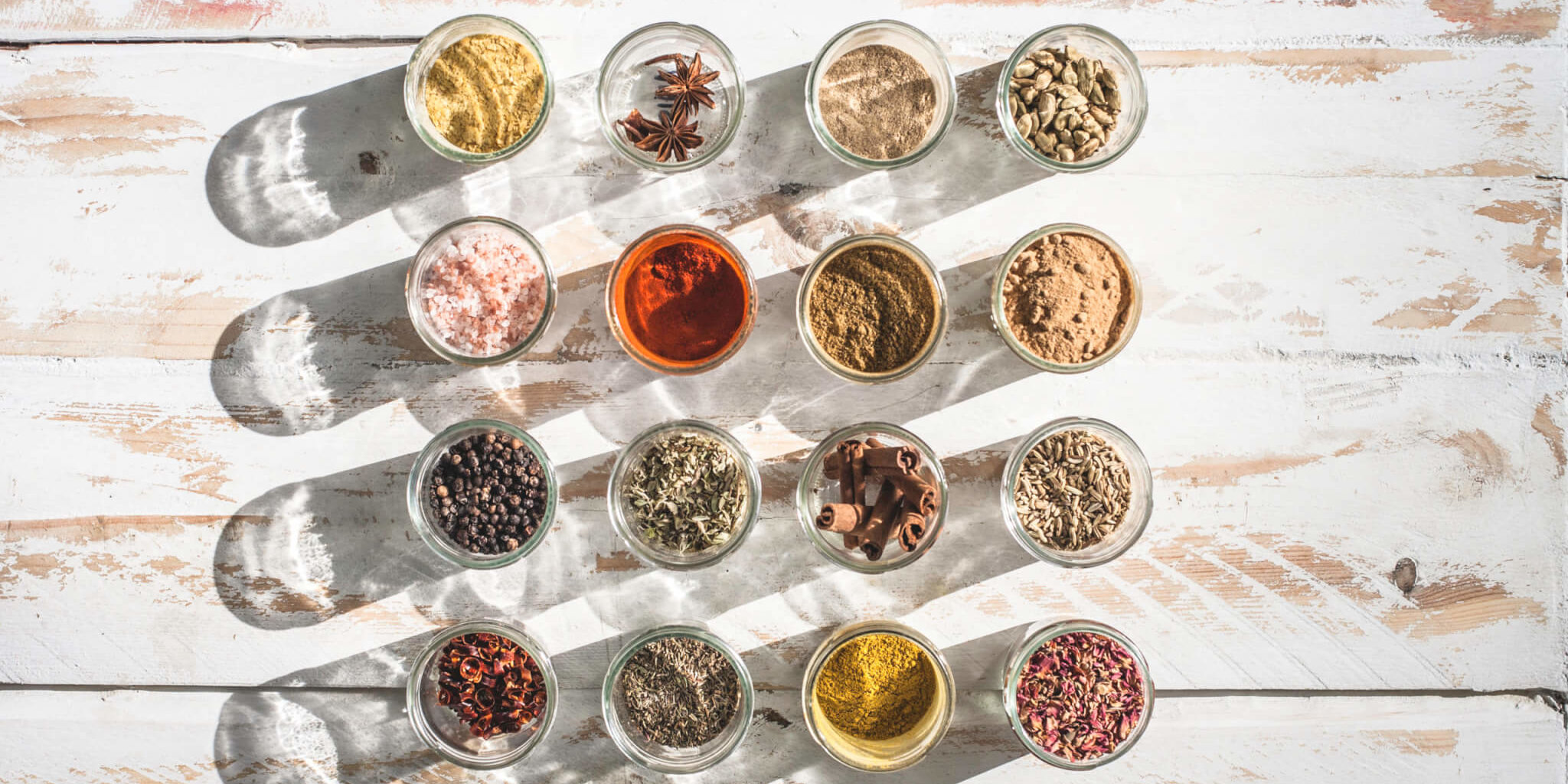Spices come from the seed, fruit, root, or bark of plants. Different from spices, herbs are the leaves, flowers, or stems of plants used for flavoring or garnish. Herbs and spices have been used as currency at various times in world history and their value for flavor and health has been revered for thousands of years across the world. In this discussion of the benefits of spices and herbs, I will call out the nutrition benefits as well as the flavor benefits. After learning about what these small but potent substances do, I am sure you will be inspired to pick up a spice or two and add it to your next meal.
Add spices and herbs to your meals to boost your micronutrients
Spices and herbs contain a variety of your micronutrients: vitamins, electrolytes, and minerals. From vitamin A to zinc, you’ll find almost every micronutrient in your spices and herbs. When it comes to dried vs. fresh herbs and spices, dried are more shelf stable, while fresh will have a lot more flavor. In some cases, fresh will have more nutrition and in others dried will have more. I recommend getting a combination of both for your tastebuds and health.
Though all spices contain micronutrients, here are a few I love because they have great nutrition and flavor you can add to many different meals.
-
- Nutmeg: An autumn and winter favorite, add it to your coffee or tea, smoothies, desserts, or yogurt snacks, and it is even delicious on green beans. This spice is a good source of copper, potassium, calcium, manganese, iron, zinc, and magnesium. Rich in B vitamins, beta-carotene, and cryptoxanthin.
- Garlic: Though technically a vegetable, you will often see it listed as a spice in your recipes. It can be found fresh or powdered, and both types of garlic have such versatile flavors. This spice is a good source of manganese, B vitamins, vitamin C, copper, selenium, phosphorus, selenium, calcium, and flavonoids. Top tip: Try roasting your garlic before adding it to your recipes to add a sweet and nutty flavor.
- Paprika: My personal favorite is smoked paprika. Paprika is great in all types of soups, curries, savory baked goods, essentially any recipe that gives you that warm, cozy feeling. The paprika boosts that warm quality without adding too much heat. This spice is a good source of vitamins A, E, and B6 and iron, and a tablespoon has about 20% of your DV for vitamin A.
Add spices to your meals to boost your phytonutrients
Though the research is not conclusive, many studies suggest that the phytonutrients in spices and herbs offer various health benefits, such as heart health, immune system benefits, and many others (1).
- Antioxidant benefits: Turmeric is a fantastic root full of amazing flavor and health-supporting nutrients (2). You can find the root fresh or powdered. Previously, I wrote an article on simple and delicious turmeric recipes you should try. (add link)
- Balancing blood sugar: According to many studies, cinnamon has the benefit of supporting a balanced blood sugar (3). It is a spice you can add in every day and know you are enjoying its yummy flavor and health benefits.
- Reduce your seasonal allergies: Rosemary, which contains rosmarinic acid, has been studied for its potential to reduce symptoms from seasonal allergies (5).
One final health benefit of spices and herbs is that you can add tasty flavors without any artificial enhancements or processed flavorings. Artificial and processed flavorings are those that come in boxes and sauce bottles and do not come from whole foods. We want to avoid these as much as possible. Sticking to whole foods, which include our spices and herbs, is the best choice for our health and our taste buds.
 Sarah is the Shaklee Pure Performance Team dietitian/nutritionist. She is also a two-time competitor for the USA in the Summer Games, participating in the 10-meter Air Rifle event in 2012 and 2016. Her experience as an elite athlete and her status as a Registered Dietitian Nutritionist (RDN) and Licensed Nutritionist (LN), make her perfectly suited to consult with Shaklee athletes on their nutritional needs. Sarah graduated from Texas Christian University in Fort Worth, Texas with a BS in Nutrition in 2013, and then earned an MBA in Entrepreneurship and Healthcare Management. She specializes in weight loss, improved sport performance, diabetes prevention, heart health, healthy aging, smoking cessation, and performance goals. Her hobbies include church ministries, mountaineering, physical fitness, and gardening.
Sarah is the Shaklee Pure Performance Team dietitian/nutritionist. She is also a two-time competitor for the USA in the Summer Games, participating in the 10-meter Air Rifle event in 2012 and 2016. Her experience as an elite athlete and her status as a Registered Dietitian Nutritionist (RDN) and Licensed Nutritionist (LN), make her perfectly suited to consult with Shaklee athletes on their nutritional needs. Sarah graduated from Texas Christian University in Fort Worth, Texas with a BS in Nutrition in 2013, and then earned an MBA in Entrepreneurship and Healthcare Management. She specializes in weight loss, improved sport performance, diabetes prevention, heart health, healthy aging, smoking cessation, and performance goals. Her hobbies include church ministries, mountaineering, physical fitness, and gardening.






